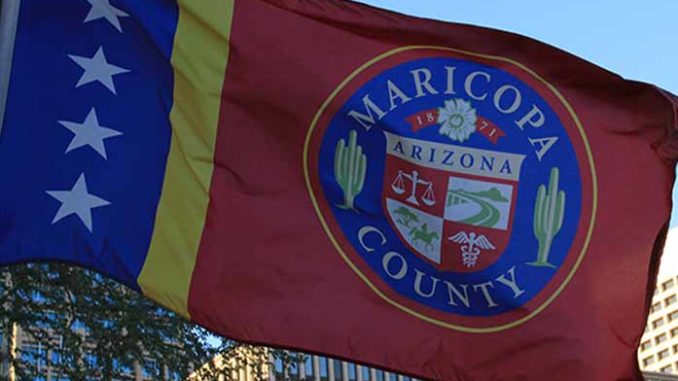
Some employees are questioning Maricopa County’s compliance with its own policies about the use of social media platforms such as Twitter and Facebook on behalf of the county. Particularly when the topic is the State Senate’s audit into how the county handled the 2020 General Election.
“When addressing the public in any way we’ve been instructed to communicate our opinions in a manner that guarantees everyone know we are speaking on a personal level,” according to Sue, a longtime county employee. “Yet for the last several months we have seen highly politicalized and even offensive comments being tweeted and posted on behalf of ‘Maricopa County’ which violate those principles.”
And Sue told Arizona Daily Independent many of those social media comments about the Senate’s audit appear to violate county policy.
Maricopa County’s Social Media Guide states the county supports the use of social media “to enhance public communication, collaboration, and information exchange.” The 10-page guide outlines how social media should be used by all county appointed departments, along with the Flood Control District, Maricopa County Library District, and Maricopa County Stadium District.
The first principle is to use social media “to earn a reputation as the government that prioritizes people and service, while having fun.” That is followed by principle number two, telling “people-centric stories that personalize our service, build community, and support the County’s strategic goals.”
There is even a principle about handling inquiries and negative comments, which is to be done “promptly and respectfully.” And a disclaimer policy which allows a public comment to a social media content to be deleted if it contains “defamation to a person or people” or “threats, name calling, and/or personal attacks.”
There is also an internal policy on the acceptable use of social media. One of the provisions requires an individual with access to County social media accounts to keep “all communication on social media professional and follow established policies regarding workplace professionalism.”
In May, Jack Sellers used social media to call the State Senate’s audit “a grift” and a “sham,” Sellers, a Republican, is chairman of the county’s board of supervisors which directly oversees County Manager Joy Rich. It is Rich in turn who oversees all non-elected county departments, including the Communications Department.
Last month, a series of comments on Maricopa County’s Twitter account included other derogatory comments about the Senate’s audit. It was a continuation of such commentary dating back to the days right after the Nov. 3 election. And it is starting to not set well with some county employees, even those who don’t support the election audit.
“There are about 13,000 county employees and a good bit of us do not agree with the negative audit tweets being put out there,” said Sue, who has worked for Maricopa County more than 11 years. “It has done nothing but cause the public to have a negative impression of Maricopa County employees. But most important, it has made many of us cautious, even ashamed to tell people where we work.”
Fields Moseley is the director of the county’s Communications Department. He and Jason Berry “approve content before publication,” Moseley says, “High profile messaging on sensitive matters involving Board decisions is discussed with the chairman’s office before publication.”

For Sue and several other county employees, their complaints with the audit comments are about the snarky tone of the senate criticism “and the hypocrisy being condoned” by Rich and the board of supervisors.
“I can’t imagine what would happen to a sheriff’s deputy who tweets a condescending comment about something the City of Phoenix does, or maybe a decision by a major business CEO,” she said. “It’s not right that any county employee gets to hide their identity when tweeting or posting something that sullies anyone’s integrity. Not when it’s done in the name of Maricopa County.”
The heads of two Maricopa County employee associations also recently told Arizona Daily Independent their members are growing frustrated by the “pettiness” of comments coming from the board of supervisors, elected officials, and some employees.
One said he believes the five supervisors “appear to be letting their hurt egos” get in the way of protecting Maricopa County’s good image and name. Plans were even underway last month to confront Rich about the social media content.
“It took awhile but we had two well-known, well-respected people ready to speak up last month,” the association official said. “But then there was another round of negative, offensive anti-Senate audit Twitter stuff. We knew then that anyone speaking up would likely face retaliation.”
Even the prospect of an anonymous complaint died away, the association official said. “Who can afford in this economy to be painted as a troublemaker and possibly even lose your job?” he asked.
One person not concerned about fallout from social media content is County Recorder Stephen Richer, who has been active on Twitter to ridicule some elements of the Senate’s audit. As an elected official, Richer is accountable only to himself and voters for his comments, as are the supervisors.
And then there is Joseph La Rue, a high-ranking member of the Maricopa County Attorney’s Office. Like Richer, La Rue is no stranger to using Twitter to disparage those involved in the audit. But unlike Richer, La Rue is not an elected officials.
In fact, he serves as one of the county’s lawyers in litigation involving the audit, which he has critiqued and criticized a lot on Twitter. Conduct that the other association official says appears to violate the number one item under the “What Not to Post” section of the county’s social media guide.
“The policy says not to post about items in litigation or claims that could be brought against the County. Well he may be tweeting on a private account, but he is the face of the county’s legal team opposing the audit,” said the association official. “That is not professional conduct for a county employee.”
.



